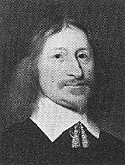 Watching Warily
Watching Warily
Oxford - June 1644 and nearly two years into England’s Civil War. King Charles I (at right) watched from this city, with his small army, the perilous advance of two enemy armies.
Oxford had been exposed to their assault through some major bungling, the truth of which has never been unearthed. The town of Abingdon was abandoned, but not on the King’s orders and although this provided 2500 men for the King’s small force in Oxford, it opened the South side of Oxford up like an open wound.
 The enemy commanders, Sir William Waller (at right) and the Earl of Essex, hastily made for the bait and for the King and his party, tension was turned high.
The enemy commanders, Sir William Waller (at right) and the Earl of Essex, hastily made for the bait and for the King and his party, tension was turned high.
By June 2nd, Waller was at Newbridge and Essex was only 5 miles away at Islip, under a days march. Charles was confident and determined to get though things, but his advisors were in a bleak mood. The King had seen no experience of warfare until 1642, when war broke out, but from the start, he was determined to learn and eventually take active command. Learning whether watching a battle, talking to his commanders, poring over model troops or taking part in military displays. This had paid off and he felt confident in the face of this enormous threat.
The net was closing and the enemy troops practically surrounded his city, a siege would mean it would all be over for him, Oxford was not victualled for long. The potential end of his cause prompted one of the King’s advisors to sue for peace. Charles was mortified and angered, sticking to his guns he declared with passion, "Possibly I may be found in the hands of the Earl of Essex, but I shall be dead first!"
Using his hastily gained knowledge, the King took a firm lead and ordered a feint attack on Abingdon, successfully drawing Waller away from Oxford. This provided the fraction of breathing space required for him to escape from Oxford.
Marching out with 2500 musketeers, the King met up with his 5000 horse and marched west, leaving his enemies empty handed and foiled. Essex and Waller were no great friends and this blow caused friction.
On June 6th, Charles arrived at Worcester, in a jubilant and victorious mood. He had saved his cause and proved his worth as a great commander through this skilful and daring move. Morale lifted, but the King knew he was not over it yet, for both armies ha begun the chase and again it looked as though they would net the King in.
Intervention of Fate
On the 6th, Essex and Waller got together in a conference to decide how to proceed. Essex had long been jealous of Waller’s popularity and took the opportunity to part company. Essex left Waller to capture the King and declared he would save the little town of Lyme on the south coast.
Essex was feeling vulnerable and hoped his relief of Lyme, which he accomplished on 15th, would boost his popularity and he ignored orders from Parliament.
With one army marching away, the King saw his position greatly improved and resolved to head back to Oxford to pick up more men and consolidate his position.
By now, the King had built up his army to 5000 foot and 4000 horse, now a match for Waller’s single army. It was nightfall on 27th June when the King heard some major intelligence. Whilst he was at Culworth, Waller was close by at Banbury and the King resolved to offer battle, giving orders to march in Waller’s direction. Rising early on 28th, the King’s army marched through the mist and rain, which eventually cleared to show Waller’s army in the distance.
Waller then took up position on Crouch Hill, while the King occupied Grimsbury Hill, both sides eyeing each other up like wild animals.
Charles knew he had to tempt Waller down from his strong position before battle could be joined, and as such his men skirmished with Waller’s until it was obvious the Parliamentarian was determined to stick to his safe hill. Charles acted with military astuteness when he decided to march towards Daventry, drawing Waller after him. They marched on the opposite sides of the River Cherwell, little more than a mile apart and waiting for the inevitable opportunity to arise.
The King dined under a huge ash tree, which would later be the point of action.
Old Lord Brentford, the King’s lovable Commander-in-Chief, sent a force of dragoons to hold the bridge ahead of them. At nearly 71, Brentford was gouty, deaf and drank to excess, but he was clearly still a very capable commander.
As they reached Cropredy, the distance between them opened to 2 miles and the King was brought news of 300 horsemen heading to join Waller’s army from the north. Charles ordered the van of his army to stop the enemy reinforcements. This caused the van to speed up and leave the rear behind, causing a visible gap in the marching column.
Waller spied this quickly and sent 1000 horse across the ford at Slat Mill, to engage the Royalist rear and another 1500 horse and 1000 foot to wipe the Royalist dragoons from Cropredy Bridge and attack the van. Waller’s force, which was sent against the Royalist rear, met with some success until the young Earl of Northampton forced them back across the ford.
The King saw Waller’s plans and made a stand at Hays Bridge, watching as Lord Cleveland occupied some high ground opposite Cropredy Bridge with his horsemen. The dragoons guarding the bridge had abandoned it to the Roundheads and Cleveland saw the enemy coming to charge his rear. There was no time to await orders now and Cleveland routed the enemy, before the King sent his young cousin, Lord Bernard Stuart to his aid. A second wave came against Cleveland, but with the ferociously loyal 100 King’s Lifeguard under Lord Bernard, beat the enemy off for the second time.
The force went on to clear the enemy back over Cropredy Bridge, capturing the artillery and one certain turncoat.
James Wemyss the defector, pleadingly told the unconvinced King, "My heart was always for Your Majesty." Waller still held the ford and the bridge, but fell back in the face of his defeat. The King was not content however to leave things as they were. He saw Waller still held one last trump card in his dwindling deck; the access over the river.
By now it had warmed up and the sun heated men’s hearts together with their cause. Charles knew what he needed to do next.
Charles sent his forces to gain possession of both these vital points, but only succeeded in gaining the ford. Both armies were back to square one, occupying high ground and watching each other, until the King’s victorious men came off their heights and began firing on the enemy cavalry.
This dislodged them and Waller was left to see that one lone cannon had its important target in sight. Providing the cannoneers with telescopes, they were pointed out the King, who had so successfully brought victory to his side.
Evidently dismayed and clutching at straws, they fired on the King’s person but this would never inconvenience Charles, for he was brave on the field of battle and if anything, provided the Royalists with outrage and seeking revenge.
Rumours of course were enough to destroy an army without any attack of an enemy, it may be that Waller was hoping to spread the lie that the King had been killed, to flatten the Royalist offensive.
Charles then took opportunity of the lull to send his Secretary at War, Sir Edward Walker to Waller, with a message of grace and pardon. Hoping again to cause mass desertion and defection though his recent victory, he aimed to show that he was their lawful King and that he would be tolerant if any should cease rebellion now.
The next day, the King could write jubilantly to his Queen, recounting the great success in two fields; first his own personal military achievement, commanding the victory and secondly, the defeat of an enemy army.
Certainly he had caused Waller’s army to become mutinous, shouting, “Home, Home!” They muttered about their quarters, threatened to leave him and despite 4500 new men under General Browne, they managed to infect those with the same disillusion. A whole enemy army had been neutralised and broken.
Charles had saved his cause and army himself and his men appreciated the lead from the front he provided. Morale was high and his thoughts turned to Essex and a defeat of the arch-rebel himself.
The extent of the King’s victory can be left to Waller’s own words to his wife, “I had nearly sunk under that affliction,” (Cropredy Bridge) and to Parliament, “I would have written to you last night, but I was utterly tired by the labours of the day.”
For more articles like this, be sure to check out the King or Parliament Magazine.
Back to War Lore: The List
Back to Master Magazine List
© Copyright 2002 by Russ Lockwood.
This article appears in MagWeb (Magazine Web) on the Internet World Wide Web.
Other military history articles and gaming articles are available at http://www.magweb.com